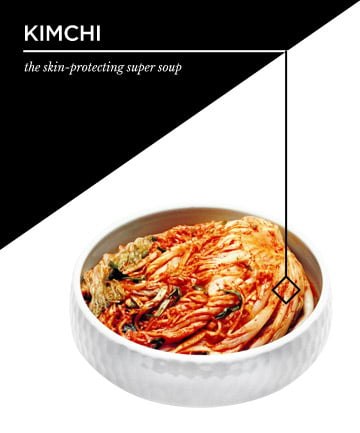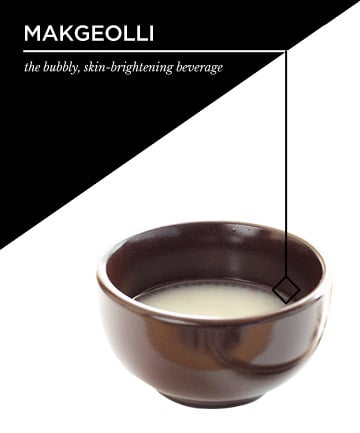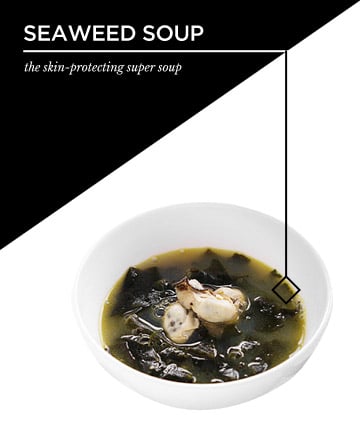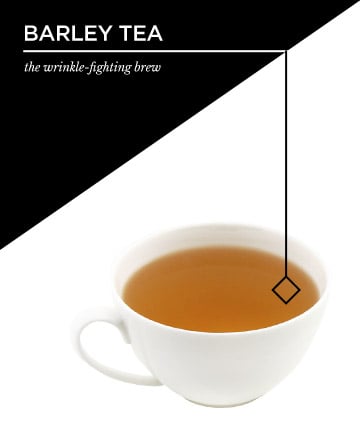What it is: Kimchi is a fermented Korean dish made of cabbage and seasoned with garlic, sugar, hot pepper and salt. Oyster or anchovy is usually added to deepen the flavor. Koreans pack it in large clay pots and leave it outside to ferment, sometimes for several months. The resulting dish is a flavorful, spicy staple that is a can't-live-without addition to every meal, according to Korean-born owner of Glowrecipe.com Sarah Lee.
Skin perks: This skunky superfood contains lactobacillus, the same good-for-you bacteria found in yogurt, which promotes a healthy balance of bacteria in the gut. Many doctors link the health of your gut to the health of your skin. Since inflammation in the gut is tied to skin issues like acne, kimchi may be the zit-zapper you've been craving.
Besides reducing acne, kimchi may prevent wrinkles by adding moisture to your skin. A study published in January 2015 found that subjects who ate the bacteria found in kimchi on a daily basis experienced improved skin barrier function and an increase in hyaluronic acid — a moisturizing ingredient you pay big bucks for in skincare products — after just four weeks.
How to eat it: Many health food stores carry jars for around seven dollars. Koreans eat it as a side dish or over rice for a simple meal.
Image courtesy Kimchi Tiger Blog
Skin perks: This skunky superfood contains lactobacillus, the same good-for-you bacteria found in yogurt, which promotes a healthy balance of bacteria in the gut. Many doctors link the health of your gut to the health of your skin. Since inflammation in the gut is tied to skin issues like acne, kimchi may be the zit-zapper you've been craving.
Besides reducing acne, kimchi may prevent wrinkles by adding moisture to your skin. A study published in January 2015 found that subjects who ate the bacteria found in kimchi on a daily basis experienced improved skin barrier function and an increase in hyaluronic acid — a moisturizing ingredient you pay big bucks for in skincare products — after just four weeks.
How to eat it: Many health food stores carry jars for around seven dollars. Koreans eat it as a side dish or over rice for a simple meal.
Image courtesy Kimchi Tiger Blog
What it is: Makgeolli is an effervescent rice wine that's slightly sweet in flavor and contains about 6 to 8 percent alcohol by volume. Made with fermented rice, yeast and water, the alcoholic beverage can be described as a cross between bubbly kombucha and a sweet, milky sake.
Skin perks: One bottle of makgeolli contains as many probiotic cultures as 100 cups of yogurt, making it a treat for your digestive system and skin. Some Koreans even apply it directly to the skin — popular Korean beauty brand Tony Moly sells a makgeolli sheet mask. It's also full of amino acids and vitamin B, which firm and brighten skin.
How to eat it: To get the beauty benefits, you need to drink fresh makgeolli that's been brewing for about a week (the longer it ferments, the less potent it becomes). A quick Yelp search for makgeolli in your area can point you in the right direction.
Image courtesy Regent Seven Seas Cruises
Skin perks: One bottle of makgeolli contains as many probiotic cultures as 100 cups of yogurt, making it a treat for your digestive system and skin. Some Koreans even apply it directly to the skin — popular Korean beauty brand Tony Moly sells a makgeolli sheet mask. It's also full of amino acids and vitamin B, which firm and brighten skin.
How to eat it: To get the beauty benefits, you need to drink fresh makgeolli that's been brewing for about a week (the longer it ferments, the less potent it becomes). A quick Yelp search for makgeolli in your area can point you in the right direction.
Image courtesy Regent Seven Seas Cruises
What it is: Move over, bone broth. Seaweed soup, a dish served in Korea for thousands of years, may soon take over as the superfood soup du jour. It's made by soaking seaweed in beef or seafood stock, and seasoned with soy sauce, salt, garlic and sesame oil.
Skin perks: "In Korea, seaweed soup is the first thing a woman eats after giving birth," says Lee. It's also tradition to eat it on your birthday, because your mom ate it after giving birth to you, she adds. The mineral-rich sea dish is chock-full of skin-saving nutrients -- just one sheet of nori (the seaweed used to wrap sushi) has the same amount of omega-3s as two whole avocados. Omega-3s help your skin maintain a natural oil barrier, and research shows a daily dose protects the skin from sun damage.
How to eat it: Try this simple seaweed soup recipe. Visit the Asian section of your grocery store for ingredients.
Image courtesy Ya!Korea
Skin perks: "In Korea, seaweed soup is the first thing a woman eats after giving birth," says Lee. It's also tradition to eat it on your birthday, because your mom ate it after giving birth to you, she adds. The mineral-rich sea dish is chock-full of skin-saving nutrients -- just one sheet of nori (the seaweed used to wrap sushi) has the same amount of omega-3s as two whole avocados. Omega-3s help your skin maintain a natural oil barrier, and research shows a daily dose protects the skin from sun damage.
How to eat it: Try this simple seaweed soup recipe. Visit the Asian section of your grocery store for ingredients.
Image courtesy Ya!Korea
What it is: Barley tea, or boricha, as Koreans call it, is made by adding roasted barley to water and bringing it to a boil.
Skin perks: Barley tea contains a large number of antioxidants. One study found that these antioxidants were effective in preventing the formation of peroxynitrite, an oxidant that attacks skin tissue and creates DNA damage — a major culprit of wrinkles. Bonus: Another study found that barley tea prevents tooth decay by preventing bacterial colonization — think of it as a hot, bacteria-killing mouthwash that is A-OK to swallow.
How to eat it: Koreans generally have barley tea available for every meal — it's often already on the table at restaurants. Depending on the time of year, it's served hot or cold.
Image courtesy Wikimedia Commons
Skin perks: Barley tea contains a large number of antioxidants. One study found that these antioxidants were effective in preventing the formation of peroxynitrite, an oxidant that attacks skin tissue and creates DNA damage — a major culprit of wrinkles. Bonus: Another study found that barley tea prevents tooth decay by preventing bacterial colonization — think of it as a hot, bacteria-killing mouthwash that is A-OK to swallow.
How to eat it: Koreans generally have barley tea available for every meal — it's often already on the table at restaurants. Depending on the time of year, it's served hot or cold.
Image courtesy Wikimedia Commons








